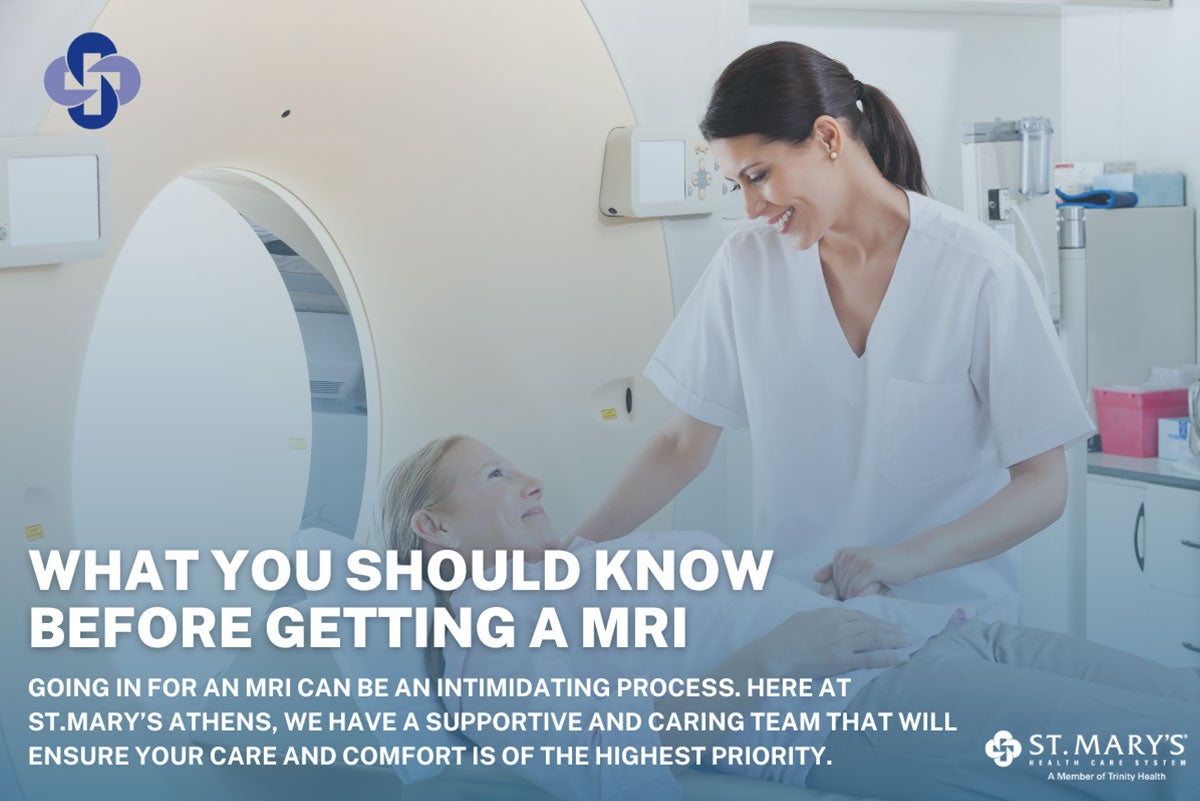What You Should Know Before Getting an MRI
September 18, 2023Magnetic resonance imaging (MRI) is a non-invasive radiation-free imaging technology.
Getting an MRI can be an intimidating process. St. Mary’s has a supportive and caring team that will ensure your care and comfort is of the highest priority. St. Mary’s Athens Radiology manager and PACs administrator, Page Meadow, and the National Institute of Health outline some basic information and helpful tips you should know before coming in for your MRI.
What is an MRI?
Magnetic resonance imaging (MRI) is a non-invasive radiation-free imaging technology that uses your body's magnetic field to produce detailed images of your body's internal organs and structures. An MRI can be super helpful in providing physicians and medical staff with the information needed to diagnose or solve various medical diseases or illnesses.
How does an MRI scan differ from a CT?
While CT scans (computed tomography) and MRI scans are medical imaging approaches that work to create detailed scans of the body's internal organs, one notable difference is that MRIs do not use damaging ionizing radiation of X-rays to create images.
What type of disorder can MRI detect?
MRIs can be used to detect a variety of diseases, illnesses, and injuries. Cancer, strokes, broken bones, bone infections, and spinal cord issues are just a few issues that can be picked up and diagnosed through MRI.
What should you tell your MRI tech?
Before receiving an MRI, you may be asked to fill out a questionnaire regarding your previous or current medical history. Be sure to inform your MRI tech if you are pregnant or have any metal implants, such as pacemakers, artificial joints, or other implants.
How long does an MRI take at St. Mary’s?
According to Page Meadow, Manager of Radiology at St. Mary's, the duration of an MRI scan can vary depending on the procedure being done. On average, patients can anticipate their MRI to last approximately 45 minutes to 1 hour; however, time may vary depending on the unique characteristics of a specific case.
How long does getting your MRI results at St. Mary’s take?
Additionally, at St. Mary's, the general turnaround time for receiving the report of an MRI scan is about 24 hours. However, it is essential to note that in some instances, the process might be expedited and result in quicker delivery of the report to your physician or specialist.
Navigating the realm of medical diagnostics can be daunting, but a firm grasp of what to expect alleviates many concerns. MRI, a non-invasive imaging technique, provides invaluable insights into various health conditions, differentiating itself from CT scans by eliminating the need for ionizing radiation. Being candid with your MRI technician about your medical history is crucial to ensuring a safe and effective scan.
With the dedicated and efficient team at St. Mary’s, patients can expect comprehensive care throughout the process, from the moment of the scan to the prompt delivery of results. Whether preparing for your first MRI or seeking a refresher, being well-informed empowers you to approach the procedure confidently.
Like all great personal health care management, you should start with a primary care provider! Speak to your PCP about any concerns and they will determine if an MRI is the diagnostic tool you need.

